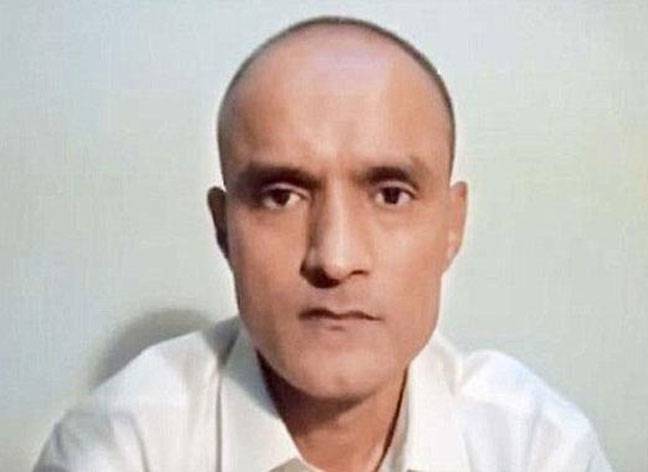ISLAMABAD - Pakistan will file its response to India on convicted spy Kulbushan Jhadav’s case in the International Court of Justice on Wednesday (today) – aiming dismissal of New Delhi’s plea to release him.
Officials at the foreign ministry said Pakistan’s legal team had finalised Pakistan’s detailed reply to India’s stance submitted with the ICJ.
The reply will be submitted to ICJ in The Hague.
A senior official told The Nation that Pakistan would challenge the jurisdiction of the ICJ to hear Jadhav’s case. “He has been convicted in terrorism cases and there is no room to be soft on him,” he said.
The official added: “We will provide evidence to the ICJ to prove his role in the killings of so many Pakistanis. His case at the ICJ should be dismissed.”
Another official said Pakistan’s response was based on the Vienna Convention and country’s ambassador in the Netherlands will submit the reply. Attorney General Ashtar Ausaf Ali is overseeing the high-profile case on behalf of Pakistan.
The official said Pakistan’s response included concrete evidence of Research and Analysis Wing agent Kulbhushan Jadhav’s confession of involvement in terror-related activities and rejection of India’s stance submitted with the ICJ.
“Pakistan’s argument is that the ICJ has no jurisdiction to hear the case of a terrorist who has orchestrated bloodshed in Pakistan. We are hopeful we will win our case,” he said.
Since his arrest last year, Pakistan had refused India’s requests for consular access to the convict and also conveyed its decision to the ICJ.
Pakistan also told the ICJ about Jadhav’s role in the terrorism acts across Pakistan that resulted in scores of deaths in the past.
India had challenged Jadhav’s conviction in the ICJ.
Pakistan also disputed the jurisdiction of the ICJ after the court observed that turning down the request for consular access was a denial of right.
Presenting Pakistani stance, Dr Mohammed Faisal had told the ICJ in May that under the Vienna Convention, hearing of criminal cases do not fall under the purview of the international court.
Dr Faisal had then said the spies did not have any right of counsellor access and India did not produce evidence provided by Pakistan against Jadhav in the court.
In May, the United Nations top court ordered Pakistan to stay the execution of Jadhav.
Pakistan has communicated to the ICJ its designation of Tassaduq Hussain Jillani, a former chief justice of Pakistan, to be its judge ad-hoc in the Jadhav case.
The procedures of the ICJ allow a party to nominate a judge ad-hoc in circumstances where there is no judge of the court with that party’s nationality.
Currently, there is no judge of the court that has Pakistani nationality, whereas Judge Dalveer Bhandari from India sits as a judge of the court.
Those appointed as judge ad-hoc are treated as having the same authority on the court as any of the sitting judges.
Jadhav has filed a mercy petition to army chief Gen Qamar Javed Bajwa, to spare his life on “compassionate grounds”.
He can still file another appeal to President Mamnoon Hussain if the army chief rejects his plea.
Last week, Pakistan allowed the mother and wife of Kulbushan Jadhav to meet him this month.
Foreign Office spokesperson Dr Mohammed Faisal said Pakistan had informed India that it was ready to allow the visit of the mother of Commander Jadhav, along with his wife on December 25th.
“A diplomat from the Indian High Commission in Islamabad will be allowed to accompany the visitors. Requisite security would be provided to the visitors,” he said.
Pakistan had earlier only allowed Jadhav’s wife to meet him but India sought permission for his mother too.
Last year in April, Jadhav was sentenced to death by a Pakistani military court on charges of espionage and terrorism.
Jadhav had confessed to the charges in a video, which was posted online by Pakistan army after his arrest.
But the ICJ halted his execution on India’s appeal in May.
Meanwhile, the third round of the Pakistan-Bulgaria Bilateral political consultations was held in Sofia on 7-8 December 2017, a foreign ministry statement said on Tuesday.
The Pakistan side was led by Ambassador Zaheer A Janjua, Additional Secretary (Europe), while Ambassador Kostadin Kodzhabashev, Director-General (Bilateral Relations), Ministry of Foreign Affairs headed the Bulgarian side.
The two sides reviewed the whole spectrum of bilateral relations and identified opportunities and possibilities for further cooperation, especially in the spheres of trade and economy, investment, culture, education, science and technology, defence, parliamentary exchanges and people-to-people contacts.
The sides expressed satisfaction at their ongoing collaboration at the UN and other multilateral fora, especially through support to each other’s candidatures.
The two sides discussed the evolving peace and security situations in their respective regions.
The additional secretary briefed the Bulgarian side on Pakistan’s efforts aimed at promoting peace and security in Afghanistan, Pakistan-India relations and human rights violations in the Indian occupied Jammu and Kashmir.
The Bulgarian side appreciated Pakistan’s role in the fight against terrorism and sacrifices rendered by it in this regard.
Pakistan considers Bulgaria an important country in the Balkan region and the European Union, and enjoys cordial relations with it.
The two sides agreed to hold the fourth round of consultations in Islamabad in 2018 at mutually-convenient dates, said the foreign ministry statement.






